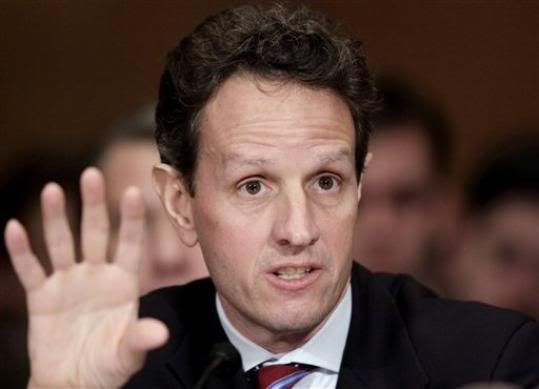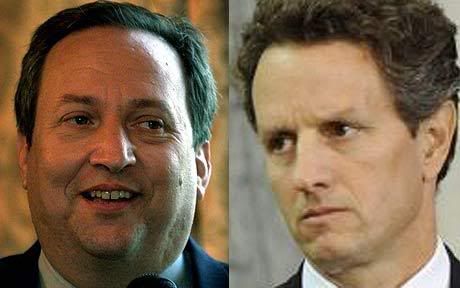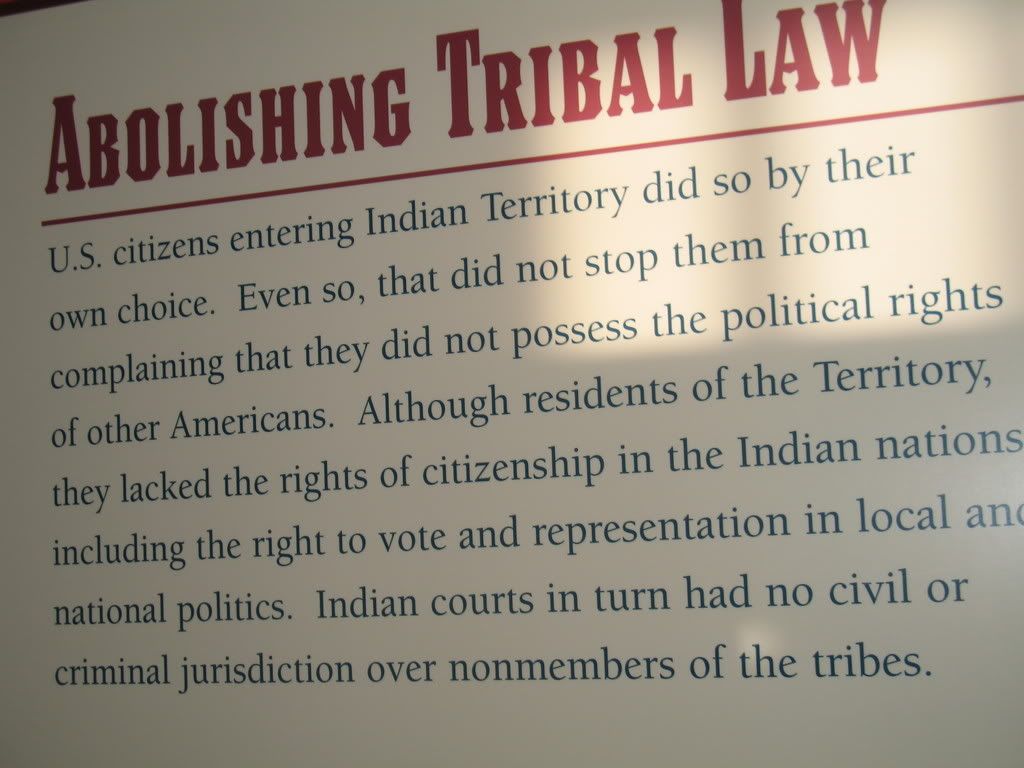
Iowa's fields of paradox lie shrouded in the gray mists of spring, the clouds churning overhead promising a white-out or a tornado. Rain changes to sleet, pelting the churned-up earth with a sound like birdshot. Only no pheasants arise with deliberate wings to seek a better refuge. It is that time of year when all hangs in the balance, when it could be sixty or sixteen, when the calendar could read March or November, when only fools think they know the shape of tomorrow.
On this day the mood of the weather seems to reflect the climate of the nation, which seems to bounce from hope to fear to sheer incomprehension. A year after Barack Obama had walked from these very fields to Washington, the Capitol Dome is enveloped in rain and fog as the new Secretary of the Treasury testifies before the House Committee on Financial Services.
His testimony will outline the administration's much anticipated regulatory plans, explaining how the White House will bring some order to an out-of-control financial industry. Yet his words mirror the weather. The forecast for the nation's capital is for more fog; the forecast for the fields of paradox mentions snow.
The Background
In the previous essay I advanced the notion that a convergence in economic philosophy between Republicans and Democrats at the end of the last century caused the present crisis. A key to understanding this are Bush's economic appointments, many of whom were cast from the same mold as Timothy Geithner, Lawrence Summers and their mentor Robert Rubin, Bill Clinton's Treasury secretary.
Summers, Rubin and Bush appointees Henry Paulson and Ben Bernanke all share similar academic backgrounds. Bernanke and Rubin both hold a Harvard Economics degree; Summers an economic degree from MIT. Paulson has a Harvard MBA. Of course it is not unusual for Ivy League types to end up with high government posts, especially in academically-oriented policy areas such as economics.
What both Republican and Democratic economic advisors dating back to the Reagan years share is an intellectual affinity for what is known as "new" or "neo classical" economics. As Nobel Laureate Robert Lucas proclaimed in 1980:
One cannot find good, under-40 economists who identify themselves or their work as 'Keynesian.
Lucas was a student of Milton Friedman at the University of Chicago and with Friedman helped to turn Chicago into a famous enclave of anti-Keynesians.
In the early 1980s economic thinking on the Charles River also began to change as Marvin Feldstein, Stanley Fischer and Rudiger Dornbusch taught variations of the neo-classical approach to students such as Rubin and Bernanke. Justin Fox notes in a seminal article for Fortune:
The products of this atmosphere include a disproportionate number of the world's most prominent economists.
Fox explains what unites these policy-makers:
The members of this group don't fit into any neat ideological or doctrinal category, but they are generally skeptical of both unfettered capitalism and government efforts to fetter it. They share Keynes' conviction that markets can go wrong (some of the younger ones even call themselves new Keynesians) but have also accepted the criticisms of Friedman and Lucas.
As Fox points out, what unites both is a faith in the market that goes back to Adam Smith. The disagreements are over the degree to which one intervenes in the market. In general Republican policy makers such as Reagan economic advisor Feldstein tend to lean more towards the Friedman side, while Democrats such as Rubin lean more towards the Keynesian side.
The Democratic version of this has come to be termed "Rubinomics" in name of Bill Clinton's former Treasury Secretary. The New York Times gave perhaps the most succinct definition of Rubinomics:
Balanced budgets, free trade and financial deregulation.
All three are measures that both Republicans and Democrats have supported.
Early Warning Signs
Within economics the conflict between the neo-classists and those favoring other approaches has raged for several decades. In 2003 the Chronicle of Higher Education took note of the dispute in an article by Peter Monaghan which began:
How do you start a fire under a huge wet blanket? A faction of disgruntled economists says that is their predicament.
Bruce J. Caldwell, a historian of economic thought at the University of North Carolina at Greensboro worried:
Everyone is trying to be a little MIT or a little Harvard, and look exactly the same because that's the way you get scientific prestige.
As the 2008 election heated up, the dominance of disciples of Rubinomics on the Obama economic team inspired several warnings from those who believed Rubinomics played a role in the present crisis. Perhaps the loudest and most persistent critic is economist and New York Times columnist Paul Krugman. Just after the election Krugman wrote:
What worries me is there is not one person in the senior group who is the outsider to this club. Where is the diversity of opinion in this economic team?
In 2007 Thomas Palley wrote in The Nation:
Before Democrats can begin to reverse a generation of laissez-faire policy dominance that has put corporations and CEOs ahead of working families, they must debunk Rubinomics, which makes the budget deficit the central focus of economic policy.
This January the Wall Street Journal had the following obituary:
If our Washington, D.C., readers noticed a cortege of blue suits carrying a casket in front of the Brookings Institution last week, be not mournful. You were merely watching the leading economists of the Democratic Party burying the faith once known as Rubinomics. May it rest in peace.
Both the WSJ and the Nation make the same mistake--which in itself ought to tell you something--in focusing on balanced budgets as the defining characteristic of Rubinomics while ignoring the other two tenets identified by the Times--free trade and deregulation. Much has been made in recent months about the Democrats returning to Keynesianism because of the large deficits that are a central part of the Obama economic plan, but little has been said about the other two. That is why Geithner's was eagerly anticipated, for would it signal a complete break with Rubinomics by one of Rubin's own disciples and the Obama Administration?
A Divergence
It is the deficits that have stirred up an ideological battle many thought had died. The field shifted quickly after the last election. Where Republicans and Democrats had both shared a penchant for balanced budgets, it became clear that the ever-deepening economic crisis would require altering that idea. For a brief moment it seemed as though both parties had executed a swift 180, but that died as people began scrutinizing the Obama budget,
Normally after a watershed election such as 2008, the losing party moves more towards the center, but many in the GOP now blame attempts at moderation for their loss. They also have begun to look back on the eight years of George W. Bush as another straying from the righteous path. In their view what caused this Depression was not that Bush was a Republican, but that he was not Republican enough, which is why Bush may be one of the few Presidents vilified by both the opposition and his own party.
At the same time the Democrats seemed to borrow a page from the New Deal, proposing massive infrastructure investments and deficit spending. So was Rubinomics really dead? Had his two disciples Geithner and Summers changed their allegiance?
This is where Geithner's testimony--and the major remaining pillar of Rubinomics, deregulation--becomes extremely important for understanding the policy direction for the next few years.
Geithner's Testimony
Asked what ht thought about Geithner's testimony on National Public Radio's weekly review of events, New York Times columnist David Brooks answered as if he had been reading this series:
Second coming of Adam Smith.
His sidekick, Washington Post columnist E.J. Dionne (who also works for the Brookings Institution--the home of the Hamilton Project and a Rubinomics outpost) answered in true Rubinomics fashion:
They're playing things down the middle.
Hearing Dionne I thought of Jim Hightower's book There's Nothing in the Middle of the Road but Yellow Stripes and Dead Armadillos.
Geithner's testimony is notable not so much for what he said, but what he did not say. It is hard to believe that in yet another appearance before Congress, Geithner has yet to even mention the words Glass-Steagall. It is as though there is a taboo on them in the White House.
Glass-Steagall, of course, represents an economic philosophy that contradicts all three tenets of Rubinomics--Balanced budgets, free trade and financial deregulation--and Geithner was not about to repudiate his mentor or start a fight with fellow Obama economic advisor Summers. Instead both Dionne and Brooks got it about right.
Geithner began his pitch as of he had been prepping for his appearance by reading old Summers' speeches about the twin causes of economic recessions, only more than Summers Geithner put his emphasis on the system being "unstable and fragile." In true Rubinista fashion he notes:
Innovation and complexity overwhelmed the checks and balances in the system.
Then comes a key transition in his testimony when he admits there were problems:
Compensation practices rewarded short-term profits over long-term return. We saw huge gains in increased access to credit for large parts of the American economy, but those gains were overshadowed by pervasive failures in consumer protection, leaving many Americans with obligations they did not understand and could not sustain. The huge apparent returns to financial activity attracted fraud on a dramatic scale.
I quote this section at some length to point out a common theme running through Geithner's analysis:in each of these sentences Geithner is in essence saying individuals took advantage of the system. Clearly the Obama Administration has decided that its explanation for the crisis is going to be that at its root are those old villains excess and greed.
This has three implications. First it has the virtue of excusing Rubin and other policy-makers who have been accused of planting the seeds of this depression, for if greed and excess were the problems that means that policy had nothing to do with it. People took advantage of what were essentially sound policies. Second, by not fingering policies as the cause, Geithner and the Obama Administration also take George Bush and his administration off the hook, potentially buying good will with Republican votes that will be needed to pass any of Obama's economic legislation. Third, it plays to those in the media and the public who want someone to blame rather than something.
Once you have accepted this analysis then the solutions Geithner proposes fall into place. What are needed are regulations that will prevent this excess and greed from happening again. The system does not need an overhaul but a tune-up. This is clear in the second paragraph of Geithner's testimony:
To address this will require comprehensive reform. Not modest repairs at the margin, but new rules of the game. The new rules must be simpler and more effectively enforced and produce a more stable system, that protects consumers and investors, that rewards innovation and that is able to adapt and evolve with changes in the financial market.
Notice again the language, which you can be sure was carefully chosen. The key word is "reform" which fits well with the strategy of blaming people rather than the system for we reform criminals, but we restructure systems. Despite Republican rhetoric trying to portray the Obama economic strategy as the second coming of the New Deal, this actually is in stark contrast to the New Deal which involved significant restructuring.
The Consequences of Geithner's Testimony
By leaving two of the three pillars of Rubinomics untouched, the Obama Administration unwittingly has chosen to play the game on the Republican's court. The only one of the three pillars the administration has chosen to change is the one involving balanced budgets. This means over the last three administrations we have had some remarkable philosophical changes: the Clinton Administration's balanced budgets, the Bush Administration's record deficits and now the Obama Administration's deficit spending.
All of a sudden the GOP has found its voice again, you remember the one that talked about "tax and spend." In the fog and rain of the day Geithner testified this somehow seemed appropriate for it was as if a corpse had risen from the dead like one of those zombies in a bad horror movie. The situation would be as if the Republicans of the 1930s had decided to repudiate Herbert Hoover.
This is why I fear that the Obama Administration will be unable to deal with the crisis in a meaningful way as long as it continues to retain Rubinistas in key economic positions, for those officials will never disavow the policies that helped to cause this crisis. If individuals and not the system are the problem sooner or later the systemic causes of the crisis will again arise.
WHO is to Blame?
There is another reason Geithner's testimony could cause problems, for if you are going to blame people as the cause of the crisis that begs the question, "Which people?" If "financial activity attracted fraud on a dramatic scale" then which corporations and executives is he talking about?
For an economist--someone whose credibility depends on being able to marshal the evidence to support his conclusions--Geithner's testimony is strangely absent of specifics. Were his words written as a student paper he would receive the proverbial Ivy League "gentleman's C" or worse.
Maybe you can craft regulations that will prevent further abuses, but what people want to know is who is responsible for this mess and if they participated in "fraud on a dramatic scale" will they be prosecuted? Perhaps the most telling example of this is that three banks have been in violation of the 1994 Riegle-Neal Interstate Banking and Branching Efficiency Act which states:
The Board may not approve an application pursuant to paragraph (1)(A) if the applicant (including all insured depository institutions which are affiliates of the applicant)controls, or upon consummation of the acquisition for which such application is filed would control, more than 10 percent of the total amount of deposits of insured depository institutions in the United States.
Yet neither Geithner nor the Obama Administration have mentioned violations of this law, but instead have looked the other way. Even more disturbing is the question whether any of the three--Bank of America, Wells Fargo and J.P. Morgan--enhanced their market share using federal bailout funds.
The Law of Unintended Consequences
In fact I would argue that from a systemic point of view, Geithner's recommendations could make things worse rather than better. To understand this let's look at the crisis from a systemic perspective. As even Geithner and Summers grudgingly admit, the roots of the crisis came with the increasing concentration and integration that gripped the financial industry after the repeal of Glass-Steagall.
When you integrate and concentrate a system as happened to America's financial markets after the repeal of Glass-Steagall it triggers a host of possible consequences. First, it makes it easier for "greed and excess" to get out of control, allowing people like Bernard Madoff to pull off their schemes. Second, it means that any changes will be far-reaching and rapid. A concentrated system can be more efficient, but only when its efficiencies are aligned with circumstances.
If they are not, the results can be catastrophic. It is the systemic equivalent of that old saying, "The bigger they are; the harder they fall." The third consequence is that like a semi that has lost its brakes and is careening down a mountainside, a concentrated system that has lost its equilibrium is harder to rescue.
To see how this works, imagine America's financial system as a giant computer network composed of the networks of the institutions that are part of that system. Before Glass-Steagall the networks of those institutions were largely independent of each other. In some cases such as banks and financial institutions selling stocks and securities they were prohibited from interacting with each other.
The disciples of Rubinomics argue that this could be inefficient because all these different little networks could not compete with the larger, more integrated networks in some other countries. It takes longer for informati0n to flow through independent networks because by their very nature their connections and feedbacks are minimal. The Rubinomics supporters would even argue it is like a bunch of independent hardware or clothing stores trying to compete with Home Depot or Macys.
What we know is that every type of systemic organization has its trade-offs. Carter Glass, Franklin Roosevelt and some contemporary economists would argue that by separating banks and securities traders, they made it more difficult for those networks to become integrated. Because they were not integrated the information in one network could not "contaminate" that in another.
Now imagine each system hit by a particularly nasty virus--a recession or depression. In the more centralized system it will be easier for the virus to spread through the network because everything is interconnected. Or imagine a programming mistake or even outright fraud. In each case the more interconnected network will make it easier for these mistakes to migrate throughout the system.
In systems where the institutions are not directly connected it is far less likely for the virus to cause such extensive damage. Were Glass-Steagall in effect it would even prevent the virus from infecting certain parts of the system because they would be protected by an impenetrable firewall. Carter Glass and Franklin Roosevelt may have never heard about firewalls or computer viruses, but firewalls between banks and stock and securities traders are exactly what they were trying to build.
Take a large financial institution such as Citi. Its banking or insurance divisions may not have even been aware of what was happening in the mortgage divisions or if they were, a bad decision by the mortgage division or a bad investment by the derivatives division would have impacted the rest of the system like a virus infecting a computer network. The company may have known the bad decision/virus existed, but depending on how quickly they recognized it and the extent of the virus, it could work great damage before being finally contained. The mortgage division may have brought the virus into the system, but the interconnections allowed it to spread to other parts of the organization.
This is exactly what happened with the current recession. Geithner's proposals offer no solution to this systemic crisis because they leave this concentration intact. Instead his proposals could have the unintended consequence of further "tightening" the system, limiting its ability to maneuver. Putting a governor on a car may prevent a driver from speeding, but it also inhibits options that might avoid a crash.
There are those who argue we cannot go backwards; that we cannot break up these "too big to fail" (and getting bigger) financial giants, but that argument is a profound misreading of history. The historical parallel to the current crisis is 1893 not 1933.
The 1893 depression was triggered by concentration and integration remarkably parallel with that of today. The progressive anti-trust legislation at the end of the nineteenth century and the early twentieth century broke up the vertical monopolies that had become an economic liability for this country. The alternative would have been to follow the European example of nationalization.
The Glass-Steagall Act came about because Carter Glass and Franklin Roosevelt feared financial concentration. With its repeal the market concentrated and collapsed quickly. It was like the bursting of a balloon filled with too much hot air. Each merger and acquisition had a doubling effect just as each mortgage failure rippled through the system until it became a tidal wave. Had Glass-Steagall been in place the various sectors of the market would have been independent of one another, softening and perhaps even preventing the general meltdown that occurred.
I do not exaggerate when I say that the future of this nation hangs in the balance and neither political party currently has the right answer. Both are caught up in their common philosophical roots in neo-classical economics. One would have thought the current depression would have discredited that perspective, but unfortunately we find the people who caused the problem in charge of fixing it. It is as if FDR had hired Herbert Hoover's staff.
The End of Orthodoxy
What we need to recognize is that the prevailing economic mental models of both parties can not deal with this crisis. Rubinomics has revealed its shortcomings. To return to the laissez faire ideas some Republicans advocate, letting the market control everything with little or no government intervention would be disastrous. The Great Depression taught us that lesson and despite the efforts of revisionists like Amity Schlaes to rewrite history, no American who lived through the 1930s or has studied the 1930s would advocate abandoning the New Deal.
What we need is a new order of understanding that looks at the systemic consequences of economic policies. Systemic analysis does not offer solutions; it only lets us better understand the trade-offs. It is then up to the people to decide which trade-off is preferable.
With the financial crisis the people have never been directly presented with the trade-offs. Actually they are quite clear: we can have a more centralized system such as Rubinomics advocates that would allow us to match the giant financial institutions of other countries or we can have an independent system like we had under Glass-Steagall.
The crisis itself seems to hold the answers. Do we really want a future in which a centralized system jerks the economy back and forth between bubbles and bursts? This may benefit the "competitiveness" of those giants, their executives and major stockholders, but does it benefit the rest of us?
The alternative would be a more modernized version of Glass-Steagall that put some of the firewalls back in place. It seems obvious that giant financial institutions that contain banks that may hold our checking and savings accounts and perhaps our mortgages should not be using those funds to play roulette on the derivatives market. As Glass and Roosevelt recognized there needs to be a firewall there.
There also needs to be what Joseph Stiglitz terms more transparency. I doubt most of us knew that the same firms which held our conventional mortgages also were gambling in the subprime market. I speak from experience on that in that our mortgage was at one time held by ABN Amro and then Citi. We also did not know that our perfectly good mortagage was being bundled with more risky mortgages through "securitization." Had people known all this the "virus" that became the mortgage meltdown could have been curtailed much earlier.
Geithner's testimony offers twentieth century solutions to twenty-first century problems. It amounts to a tweaking of a bad system, making it even worse. To continue the computer analogy, instead of putting up firewalls it erects regulations which actually could make it more difficult for a concentrated system to contain viruses because any actions would have to be cleared by another layer of federal bureaucracy.
The Fields of Paradox
The fields of paradox have entrapped many a modern politician and policy-maker, for at the heart of the paradox is the tension between what statisticians term quantitative and qualitative analysis, or as an Iowan might say, between numbers and values. Barack Obama won Iowa because he understood this paradox better than Hillary Clinton. Where Clinton relied on the mircrotargeting strategy of Mark Penn, emphasizing staged media events, Obama went directly to the people.
It is ironic that this paradox describes the situation Obama's economic policy finds itself facing. Rubinomics is, above all, akin in many ways to Penn's microtargeting. Barack Obama, who is sitting in the White House largely because he understood the fields of paradox, now finds himself in the same position as Hillary Clinton. Maybe that is why his recent speeches have been strangely flat and incomplete. Were he as incompetent a communicator as George Bush he might find himself in deeper trouble.
Where Rush Limbaugh pointedly hopes that Obama will fail, few Americans share those sentiments because they know the consequences. An Obama failure may allow Limbaugh to gloat but for the rest of us it will mean more layoffs, foreclosures and bankruptcies and the erosion of the two assets the average American works a lifetime to build up--their homes and retirement (their health insurance is already all but lost).
The rain and fog that shrouded the nation's capital and the fields of paradox seem especially symbolic of America's current condition. Wall Street may be responding with a rally in response to Geithner's testimony but as David Brooks put it, Wall Street is stupid.
The rest of us still find ourselves in the equivalent of a cold drizzle, unable to discern the outlines of familiar landmarks. But what we really fear is that when the rain and fog clear they will reveal a desolate landscape because Barack Obama listened only to Geithner, Summers and Rubin and not the rest of us.
Labels: Ralph Brauer












